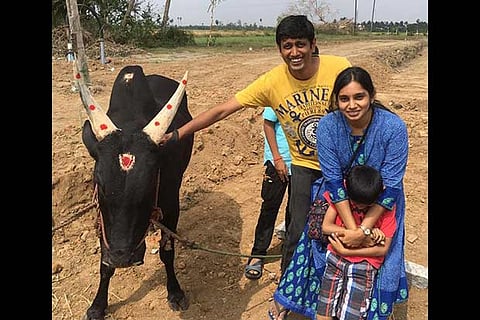Rooted to the cause
Chennai
Partha and his wife Rekha, both come from agricultural families in Tamil Nadu and just like in most cases, both their families ensured that they were given a sound education so that they have a high-flying career and they or their future generation did not have to tend the fields.
Partha is a B.Tech and an MBA while Rekha studied Commerce and followed it up with an MBA degree as well. “Our families felt agriculture is not profitable and dreamt of educating us so that we could lead a comfortable life with our high-paying jobs. Well, we also pursued academics, got good jobs and settled in Chennai,” says Partha. But in 2008 their life took a new course when a family member fell ill due to several diseases owing to diabetes, high BP and so on. They got worried, paused to think and came to the conclusion that it is all owing to an unhealthy lifestyle. “We both read as many books and did all the research we could, only to realise that most of the diseases are directly or indirectly linked to the pesticide and chemicals sprayed on the food we eat. We were not eating healthy and were spending money on all other things but ourselves,” he shares. They decided to consciously work towards a lifestyle change and started by purchasing organic food from Restore, at Kottivakkam. It was the only organic store back in 2008-09 and it was far away from where they resided.
“Since we both came from agricultural backgrounds, we decided to go back to our roots. We were inspired by organic scientist G Nammalvar, a green crusader. First, Rekha quit her job and then I followed suit. We decided to lead a life in the interest of farmers and produce healthy food, without the use of chemicals or pesticides,” shares Partha. But it was not an easy job to convince farmers to grow organic vegetables without use of pesticides. Leave alone others, even their families weren’t convinced that this was remotely possible. “We visited our respective families and encouraged them to grow organic food. But they were not ready to believe that organic farming could be sustainable. This was the case with most farmers we met and talked to about growing vegetables naturally,” he says. Rekha and Partha refused to give up. Eventually they were given a small land of 2 acres near their village in 2009 by their family to show that what they were talking about was actually possible.
(Rekha and Partha, have been propagating the organic way of life and indigenous practises to produce healthy crop)
“We accepted the challenge and worked on the field relentlessly to produce vegetables the organic way. Till date I remember how many villagers would cycle all the way to our farm to make fun of us – an educated couple who had quit their high paying jobs to carry out agriculture. Many of them had asked us to quit and go back, but the harvest surprised everybody. Not to mention the fact that the quality of produce was also much better,” recalls Partha. But the war was not won yet. The farmers refused to believe that they could harvest enough to sell in the market. To prove a point, the couple again used the same seeds that farmers were growing, but used organic methods and incidentally produced 36 sacks of grains from one acre of land as opposed to 29 sacks produced by the farmers.
“I still remember how when I had sold a few bunches of keerai grown via the organic way and sold this to a lady in Chennai. She traced our address, came all the way and hugged us. She said that she never tasted something so delicious and fresh. Small incidents like these motivated us,” he puts forth. Apart from growing vegetables for themselves and their loved ones, Partha and Rekha also go about educating farmers on the benefit of growing crops organically.
Their long term goal is to ensure sustainable community livelihood. “We aim to make organic produce available at a reasonable price. If there is reduction in processing costs, we will be able to sell organic food at a cheaper rate. They want to bring back rural livelihood and create a model that can be implemented in villages and make it sustainable,” he says.
Visit news.dtnext.in to explore our interactive epaper!
Download the DT Next app for more exciting features!
Click here for iOS
Click here for Android

